Veranstaltungen und Aktivitäten
Open access article on Japan as model in Thai conservative writings
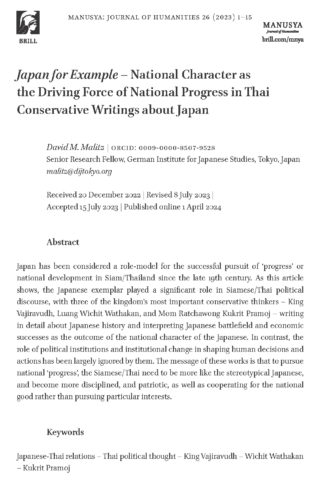 Japan has been considered a role-model for the successful pursuit of ‘progress’ or national development in Siam/Thailand since the late 19th century. As Senior Research Fellow David M. Malitz shows, the Japanese exemplar played a significant role in Siamese/Thai political discourse, with three of the kingdom’s most important conservative thinkers writing in detail about Japanese history. They interpret Japanese battlefield and economic successes as the outcome of the national character of the Japanese. The message of these works is that to pursue national ‘progress’, the Siamese/Thai need to be more like the stereotypical Japanese, and become more disciplined, and patriotic, as well as cooperating for the national good rather than pursuing particular interests. „Japan for Example – National Character as the Driving Force of National Progress in Thai Conservative Writings about Japan“ (Manusya: Journal of Humanities, 26(1), 1-15) is available open access here
Japan has been considered a role-model for the successful pursuit of ‘progress’ or national development in Siam/Thailand since the late 19th century. As Senior Research Fellow David M. Malitz shows, the Japanese exemplar played a significant role in Siamese/Thai political discourse, with three of the kingdom’s most important conservative thinkers writing in detail about Japanese history. They interpret Japanese battlefield and economic successes as the outcome of the national character of the Japanese. The message of these works is that to pursue national ‘progress’, the Siamese/Thai need to be more like the stereotypical Japanese, and become more disciplined, and patriotic, as well as cooperating for the national good rather than pursuing particular interests. „Japan for Example – National Character as the Driving Force of National Progress in Thai Conservative Writings about Japan“ (Manusya: Journal of Humanities, 26(1), 1-15) is available open access here
New open access paper on social care in rural Japan
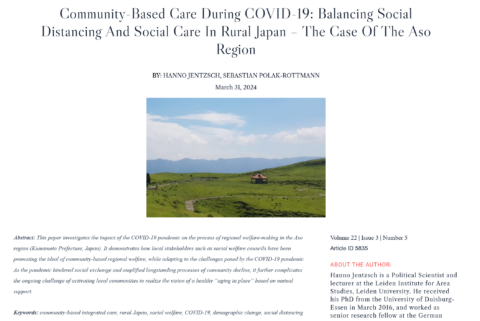
How can local stakeholders activate the local community to prevent regional care systems from collapsing? Through the lens of challenges posed by the COVID-19 pandemic, this study by DIJ political scientist Sebastian Polak-Rottmann and DIJ alumnus Hanno Jentzsch (Leiden University) reveals the strengths and weaknesses of community-based regional welfare-making in Aso (Kumamoto Prefecture). Their data demonstrates that in the Aso region longstanding social ties, trust, and mutual support constitute the normative underpinning and the concrete social foundation for preventive old age care, based on routine cooperation between communities, volunteers, and social welfare councils. However, as the pandemic hindered social exchange and amplified processes of community decline, it further challenges local communities to realize the vision of a healthy „aging in place“ based on mutual support. The paper „Community-Based Care During COVID-19: Balancing Social Distancing and Social Care in Rural Japan – The Case of the Aso Region“ (Asia-Pacific Journal. Japan Focus, March 2024) is available open access here.
Journal article by Nicole M. Mueller examines historical change in Japanese translation strategies
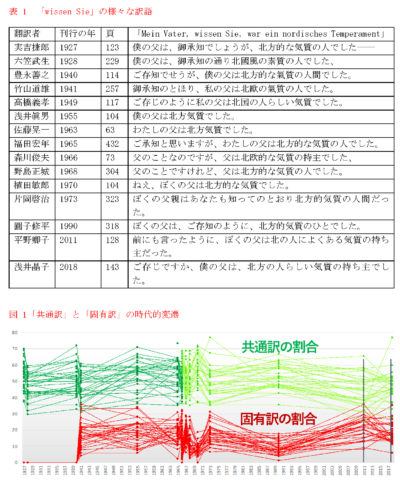
What happens if the same literary source text is translated again and again into the same target language? In her PhD research, Nicole M. Mueller set out to answer this question by conducting a digitally augmented analysis of the 15 Japanese (re)translations of Thomas Mann’s novel Tonio Kröger – a seminal text for the elitist kyōyōshugi movement that had a lasting influence on Japanese humanities and on scholarly translation culture. By implementing digital Topic Modeling as a means of operationalizing similarity scores between literary (re)translations, Nicole retraces previously hidden patterns of influence and similarity between different takes on the same source text. This reveals connections between varying historical factors and translation priorities such as faithfulness towards the source text or a natural expression in the Japanese target language. The article (in Japanese) summarizes key findings from Nicole’s PhD project and is published open access in Keiō University’s bulletin Nihongo to Nihongo kyōiku.
New issue of Contemporary Japan with ‚Art and Regional Revitalization‘ special section
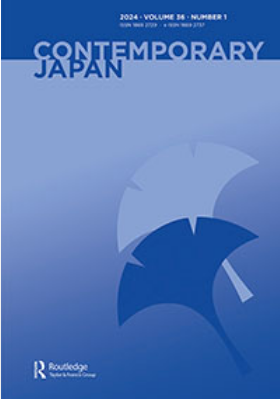 We have just published a new issue of Contemporary Japan (vol. 36, no. 1), containing a special section curated by DIJ alumna Barbara Geilhorn on „Art and Regional Revitalization – Case Studies from Japan“. It features four research articles by Eimi Tagore, Carolin Funck & Meng Qu, Anemone Platz, and Peter Eckersall & Tom Looser that assess how art festivals, exhibitions, and theatre in rural communities can „create new types of social, cultural and economic capital“. The issue also contains research articles on motherhood discourses and political activism (Rosemary Soliman Dawood), women and organized crime in popular culture (Erik Ropers), and conscription insurance in pre-war Japan (YingYing Jiang). CJ’s first „Current Topic Commentary“ article by Igor Prusa analyses the media rituals surrounding the Johnny & Associates sex abuse scandal. The book review section covers Japan’s nationalist right, a cultural analysis of Japan’s national character, immigration, and prison chaplaincy. Please see the full issue here
We have just published a new issue of Contemporary Japan (vol. 36, no. 1), containing a special section curated by DIJ alumna Barbara Geilhorn on „Art and Regional Revitalization – Case Studies from Japan“. It features four research articles by Eimi Tagore, Carolin Funck & Meng Qu, Anemone Platz, and Peter Eckersall & Tom Looser that assess how art festivals, exhibitions, and theatre in rural communities can „create new types of social, cultural and economic capital“. The issue also contains research articles on motherhood discourses and political activism (Rosemary Soliman Dawood), women and organized crime in popular culture (Erik Ropers), and conscription insurance in pre-war Japan (YingYing Jiang). CJ’s first „Current Topic Commentary“ article by Igor Prusa analyses the media rituals surrounding the Johnny & Associates sex abuse scandal. The book review section covers Japan’s nationalist right, a cultural analysis of Japan’s national character, immigration, and prison chaplaincy. Please see the full issue here
DIJ Newsletter Spring 2024
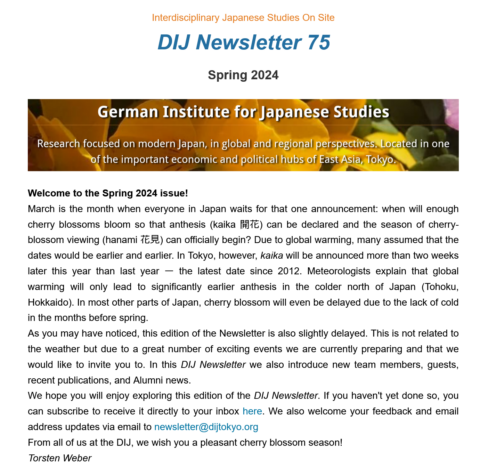 In the spring issue of our DIJ Newsletter we introduce new publications, new team members, guests, and upcoming events. We also report on Alumni news as well as on a selection of our recent academic and outreach activities. We hope you will enjoy exploring this new edition of the DIJ Newsletter. If you haven’t done so yet, you can subscribe to receive our Newsletters directly to your inbox. The full issues and subscription form are available here.
In the spring issue of our DIJ Newsletter we introduce new publications, new team members, guests, and upcoming events. We also report on Alumni news as well as on a selection of our recent academic and outreach activities. We hope you will enjoy exploring this new edition of the DIJ Newsletter. If you haven’t done so yet, you can subscribe to receive our Newsletters directly to your inbox. The full issues and subscription form are available here.
New DIJ Monograph studies political participation and well-being in rural Japan
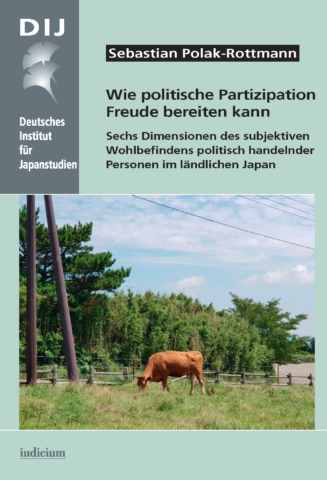
What motivates people to get involved in politics in their free time? How can they derive pleasure from it? In this new book publication (in German), DIJ political scientist Sebastian Polak-Rottmann analyses how people in rural Japan try to change local society through a variety of activities, such as agricultural, political, and social work. Based on extensive fieldwork in Southern Japan’s city of Aso (Kumamoto prefecture), he concludes that mutual enjoyment is a core element of the well-being of politically active people in rural Japan. Giving pleasure to others through activities therefore leads to a positive experience for both sides involved. With this reciprocal understanding of well-being, this book builds on relational concepts of happiness and embeds them in a new model that focuses on the connections between spatial, social, every day, individual, procedural, and temporal contexts. Wie politische Partizipation Freude bereiten kann (How political participation can be enjoyable) is published by Iudicium as volume 67 in the DIJ Monograph series.
New journal article discusses Japan’s digital capitalism and its global relevance
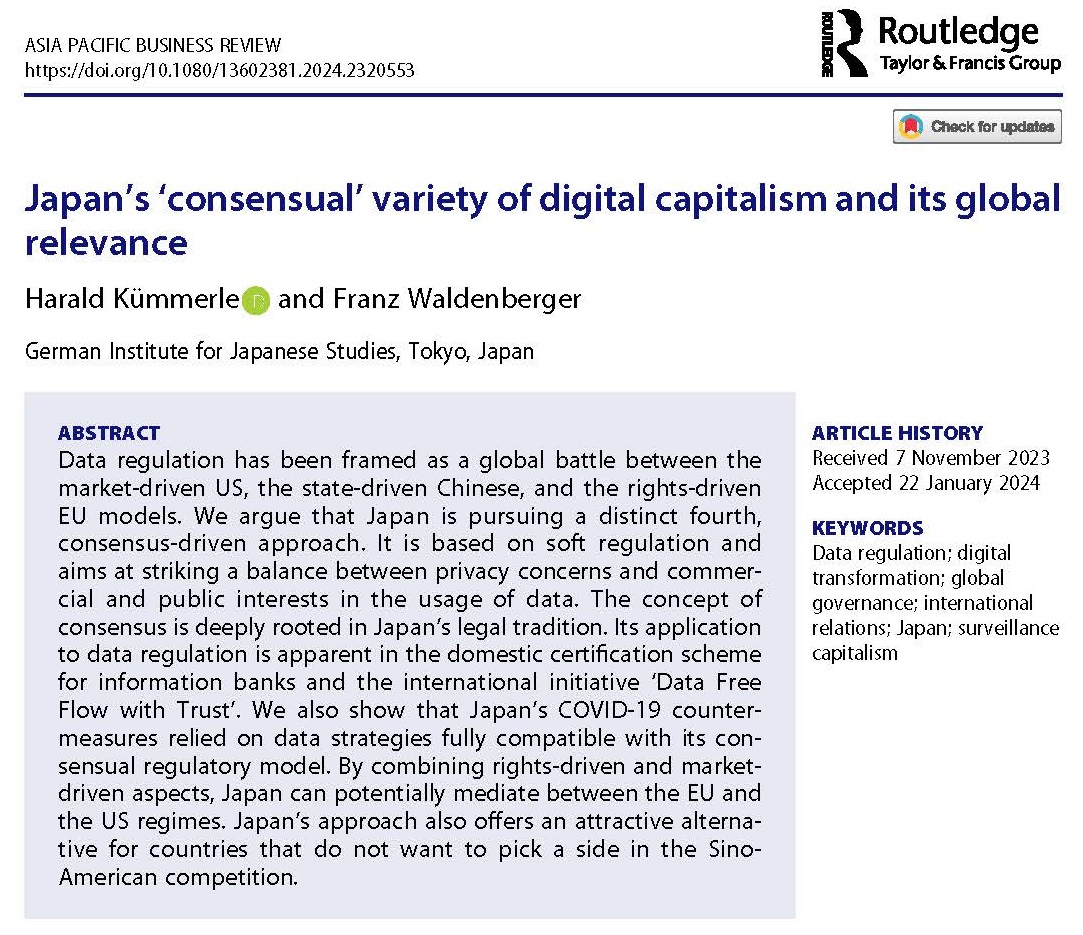 A new journal article by DIJ researcher Harald Kümmerle and DIJ director Franz Waldenberger studies Japan’s consensus-driven approach to data regulation as an alternative to the market-driven US, the state-driven Chinese, and the rights-driven EU models. The authors argue that Japan’s approach is based on soft regulation and aims at striking a balance between privacy concerns and commercial and public interests in the usage of data. They also show that Japan’s COVID-19 countermeasures relied on data strategies fully compatible with its consensual regulatory model. By combining rights-driven and market-driven aspects, Japan can potentially mediate between the EU and the US regimes. Japan’s approach also offers an attractive alternative for countries that do not want to pick a side in the Sino-American competition. „Japan’s ‘consensual’ variety of digital capitalism and its global relevance“ was published in Asia Pacific Business Review (online first).
A new journal article by DIJ researcher Harald Kümmerle and DIJ director Franz Waldenberger studies Japan’s consensus-driven approach to data regulation as an alternative to the market-driven US, the state-driven Chinese, and the rights-driven EU models. The authors argue that Japan’s approach is based on soft regulation and aims at striking a balance between privacy concerns and commercial and public interests in the usage of data. They also show that Japan’s COVID-19 countermeasures relied on data strategies fully compatible with its consensual regulatory model. By combining rights-driven and market-driven aspects, Japan can potentially mediate between the EU and the US regimes. Japan’s approach also offers an attractive alternative for countries that do not want to pick a side in the Sino-American competition. „Japan’s ‘consensual’ variety of digital capitalism and its global relevance“ was published in Asia Pacific Business Review (online first).
Japan 2023: Articles by DIJ researchers and alumni on Japanese society, economics, history, and politics
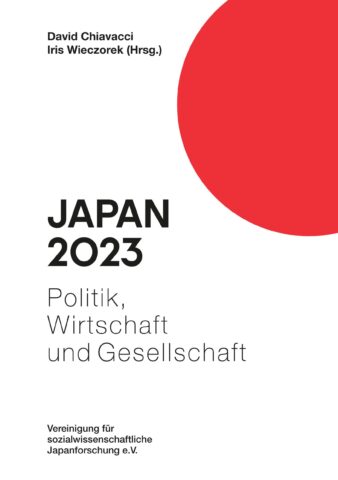
The latest issue of the Japan Jahrbuch, the yearbook published by the German Association for Social Science Research on Japan, includes four articles (in German) written by current and former DIJ researchers on Japanese society, economics, history, and politics. DIJ director Franz Waldenberger and Kostiantyn Ovsiannikov (Atsugi) provide a quantitative review of Japan’s municipalities in demographic transition, while DIJ economist Markus Heckel assesses the Bank of Japan’s monetary policy under Haruhiko Kuroda and Kazuo Ueda. DIJ historian Torsten Weber and Anke Scherer (Bochum) analyse recent developments in historical debates and historical consciousness in Japan. Former DIJ senior research fellow Christian G. Winkler (Fukuoka) examines domestic Japanese politics in 2022/2023. The volume is edited by DIJ advisory board member David Chiavacci and DIJ alumna Iris Wieczorek. For more details please see the table of content. The book is available as softcover and e-book from the publisher here.










 Open Access
Open Access 
